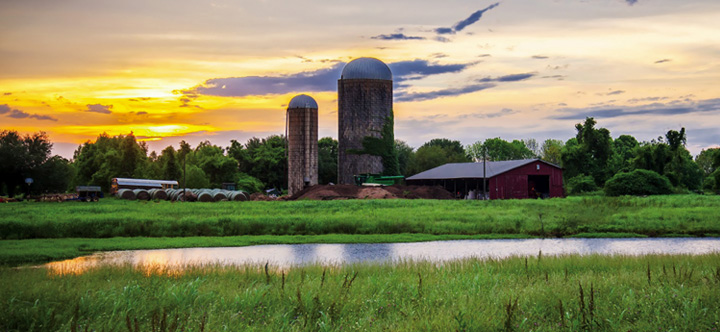Magazine
Feed The Soil: The Organic Reinvention of Inglewood Farm
Inglewood Farm in Alexandria is the largest organic operation in the state, but its history stretches back to the mid 1800s
Published: July 28, 2015
Last Updated: May 3, 2019

Photo by Khayyam Khan
The bus is also part of a careful reinvention. The surrounding 3,000 acres of prime Central Louisiana soil have changed the perception of organic farming in the Deep South. Inglewood Farm—originally known as Inglewood Plantation—is the largest operation of its kind in Louisiana. Its ongoing transition is another chapter in the fascinating story of this land and the family that manages it.
Records show that Inglewood Plantation belonged to Charles Flower since at least 1847, apparently purchased from an uncle. Flower died in 1858, and his widow, Clara Hope Sprigg Flower, was left to manage the property, along with four small boys, during the Civil War. According to a memoir written by her granddaughter, Clara’s mother permitted a Union colonel to recuperate at the Sprigg family’s Evergreen plantation during the ill-fated Red River Campaign. The grateful colonel left behind instructions that the family’s land should be spared the coming devastation. When departing Union troops burned Alexandria on May 13, 1864, destroying roughly nine-tenths of the city, they left Evergreen and Inglewood untouched. The adjacent Mooreland Plantation, owned by Confederate Governor Thomas Moore, was torched.
Clara Flower sold Inglewood in 1878, and the property changed hands four times during the next 50 years. The main house, constructed in 1836, fell into disrepair. As the rural economy struggled, former slaves and their descendants remained to sharecrop cotton. In 1894, Reverend George Washington organized the Second Union Missionary Baptist Church, and members of the African-American congregation were laid to rest in Inglewood Cemetery, still located off the main road. Once saved by the goodwill of the Spriggs, the fate of Inglewood remained uncertain until the arrival of another guiding family.
In 1926, the soil caught the eye of a businessman whose foresight helped to shape modern Louisiana. “My grandfather believed in getting land whenever you could—good farmland and good timberland,” says Caroline Keller Theus. Her grandfather, Charles Haywood Murphy, Sr., was especially gifted at selecting land. Born in North Louisiana, Murphy got his start in the rough-and-tumble town of El Dorado, Arkansas, where the young man soon found success in banking and timber. In 1907, he sold 12 of his 13 country banks and began to purchase tracts of timberland in the region. The lumber industry thrived, but Murphy sought a bigger prize. Among his land acquisitions were parts of what became known as the Smackover Field, where oil was discovered in 1921. South Arkansas became the center of the petroleum boom, and Murphy’s ascent quickened. He paid $68,000 for Inglewood and the neighboring Hard Times plantation, supposedly named for the sour disposition of a particular foreman during slavery.Murphy’s son, Charles Jr., joined the enterprise at a young age and in 1944 participated in the discovery of oil at Delhi, Louisiana. Charles Jr. and his siblings later consolidated their holdings, giving birth to Murphy Oil, a major force in the state’s economy. In 1940, his sister, Caroline, known as Polly, married Christoph Keller, who purchased Inglewood from his father-in-law. In her colorful autobiography, Polly recalls her own childhood visits to the plantation home, “with kerosene lamps for light, a wood stove for cooking and fireplaces for heat.” The couple spent their wedding night in the still dilapidated main house, and though Keller’s career as an Episcopalian priest led them to move several times (culminating in his appointment as Archbishop of Arkansas), Inglewood remained the constant in their lives.
Members of the Keller family continued to operate Inglewood as a commercial farm, but portions of the 3,000 acres were steadily divided into tracts for tenant farmers. When Bishop Keller retired in 1981, he and Polly returned to Inglewood and began to renovate the main house and several adjacent structures.
Daughters Caroline and Elisabeth each worked as farm managers, experiences that generated new questions about conventional practices.
According to the Organic Trade Association, organic products now make up almost five percent of total U.S. food sales, with more than $39 billion in sales in 2014.
“I was simultaneously gaining an appreciation for the people who made decisions, and a very strong disconnect about the way we were farming and the good stewardship of that land,” Elisabeth Keller recalls.
Since the discovery of DDT in 1939, commercial farming has relied on chemical pesticides and synthetic fertilizers to maximize harvests and profits. The organic farming movement centers on the belief that farmers must “feed the soil,” using traditional methods of crop rotation and natural fertilizers to replenish the ground’s nutrients. Advocates oppose genetic engineering and point to studies showing the health benefits of eating organic. The movement picked up steam in the 1960s and ‘70s; the federal government began certifying organic products in 2002. According to the Organic Trade Association, organic products now make up almost five percent of total U.S. food sales, with more than $39 billion in sales in 2014.
Still, doubts persisted about the viability of organic farming in the Deep South, where higher temperatures and heavier rainfall deplete the soil and increase the threat of pests. The Kellers’ early investigations were unpromising. “We would ask around and be told no,” Elisabeth says. “If you fell behind on your chemical spraying, your cotton would be devastated by boll weevils, or your soy beans would be eaten up by army worms.” Central Louisiana boasts some of the region’s richest soil, but high labor costs and strict regulations prohibited most farmers from experimentation. The government requires three years of soil remediation before crops can be sold as organic—a long, costly wait for most operations.
The Kellers were unbowed. When Elisabeth took over Keller Enterprises, which oversees Inglewood, in 2007, the family made what she calls a “careful decision.”
“We realized that it was risky, we understood why other farmers weren’t taking this risk, and we thought, ‘We’re the ones who should take this risk.’ ” Led by Polly’s grandson, the late Corwith Davis, the family created a business plan. They set aside ten acres of land for vegetables, with a goal of acquiring more land as their commercial tenants’ leases expired. Originally a source of doubt, the demand for organic products in Louisiana was soon evident. The farm-to-table movement was gaining ground in New Orleans restaurants, and the Whole Foods supermarket chain became an early buyer. The turning point, however, was the response of their neighbors in Central Louisiana.
“My first six months, all I did was go around and talk to civic groups, trying to get them aware of what we’re doing,” says Lee Weeks, operating manager at Inglewood since 2012. “I found out early on that, if I would mention the word organic, the first response to that was, well, that’s just a tool to charge high prices.” When Weeks shifted his emphasis to buying local produce and preserving the area’s fertile soil, perceptions changed. New farmers markets began popping up in the area, where Inglewood’s products continue to find customers. “Now when I go into to speak with the Kiwanis or Rotary Clubs, organic is splashed on the screen and everyone is excited about what it means.” The transition wasn’t merely social: Weeks recalled wheat crops that didn’t meet organic standards and battles with pests that devoured pecans. Going organic in the South required repeated experimentation.
“We realized that it was risky, we understood why other farmers weren’t taking the risk,” says Elisabeth Keller. “We thought, ‘We’re the ones who should take this risk.’”
Of the original 3,000 acres of Inglewood Plantation, almost 1,800 were farmed using commercial practices; by 2016, 1,000 of those acres will be part of the organic operation. “When we started this, I never dreamed it would go as well as it has,” said Elisabeth Keller. “It’s not been easy, and we’ve met some setbacks, some failures. The greatest thing has been the response of the community in Central Louisiana.” In 2011, Keller Enterprises partnered with the Central Louisiana Community Foundation and the Food Bank of Central Louisiana to launch The Good Food Project, an initiative to promote healthy diets through community gardens.
The legacy of Polly Keller Winter is evident in these efforts, and on the land itself. The Second Union Missionary Baptist Church remains an integral part of the community. When Pastor Joseph Martin was appointed in 2001, he led a major cleanup of the Inglewood Cemetery. “There were crosses missing, but you could see where the ground was sunken in,” says Pastor Martin. The church raised funds to place metal crosses on 125 unmarked graves. The Kellers sent a stump grinder for the trees brought down by the parishioners, and Polly spoke at the 2002 re-dedication of the cemetery. When the congregation made plans for a new sanctuary, the Kellers arranged for renowned New Orleans architect Errol Baron to assist in the design.“We’re about doing our Father’s business,” says Pastor Martin, “and the relationship with the Keller family and this community continues to this day.” Nearly 300 members belong to the church.
As Inglewood continues its transition to a fully organic operation, another generation has engaged with the land’s history. Hannah Timmons, granddaughter of Polly Keller Winter, returned recently to begin filming a documentary film about Inglewood—the antebellum plantation and the innovative farm. “One of my hopes is to find all of the people who have worked on Inglewood since its earliest days,” says Timmons. “The fact that we’re doing this sustainable approach means we’re healing the land, but with the film, we’re also trying to heal part of the past.”
“Every day I learn more.”
—–
Brian Boyles is Vice President of Content at the Louisiana Endowment for the Humanities.
For more information about Inglewood Farm, visit www.inglewoodfarm.com.
